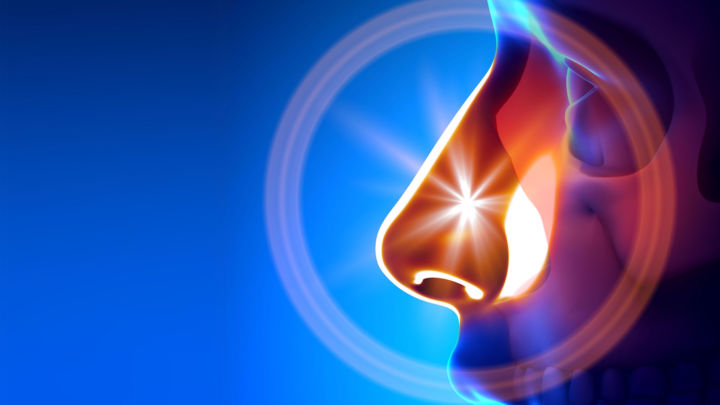What is chronic sinusitis?
Chronic sinusitis is a long-term condition where the lining of your sinuses becomes swollen and inflamed.
Sinuses make mucus that help to keep your nose moist and free from pollutants. When sinuses are infected, it can block mucus drainage and cause difficulty in breathing through your nose.
What causes chronic sinusitis?
Chronic sinusitis can be caused by several factors. They include:
Nasal Polyps
Tissue growths also known as polyps can block your nasal passage or sinuses.
Allergies
Inflammation caused by allergies or asthma can block sinuses.
Both chronic sinusitis and allergic rhinitis are closely related. Allergic rhinitis, which causes your nose to become swollen and inflamed, can potentially block the sinuses and lead to chronic sinusitis.
Deviated Septum
It is a structural displacement of the nasal septum that can cause restriction or blockage of your sinus passage.
Respiratory Tract Infections
Respiratory tract infections caused by viruses or bacteria can cause your sinus membranes to be inflamed and block mucus drainage.
Other Medical Conditions
Conditions such as cystic fibrosis, HIV, and other immune system-related diseases can lead to chronic sinusitis.
What are the symptoms of chronic sinusitis?
Sinusitis is considered chronic when your symptoms last for 12 weeks or longer.
Common signs and symptoms of chronic sinusitis include:
- Thick, yellow or green nasal discharge
- Congested or stuffy nose
- Mucus dripping down the back of your throat (post-nasal drip)
- Pain or tenderness around your eyes, nose, and forehead
- Reduced sense of smell and taste
- Bad breath
- Headache
- Tooth pain
How is chronic sinusitis diagnosed?
During a physical examination, the doctor will check for tenderness in your nose and face, in addition to any swelling inside your nose.
Besides noting your symptoms and medical history, the doctor may also perform further diagnosis to determine the cause of your condition:
Endoscopy
The doctor will insert a thin, flexible tube with a fibre-optic light to check the insides of your nose and sinuses.
Imaging Tests
MRI or CT scan can detect any structural issues or blockage caused by a deviated septum, polyps, or tumours through images of your nasal area.
Allergy Tests
An allergy skin test can help detect the allergens that may be triggering your chronic sinusitis.
What treatments are there for chronic sinusitis?
Depending on the diagnosis and severity of your condition, your ENT doctor may recommend the following treatments:
Medications
Non-steroidal anti-inflammatory drugs such as ibuprofen and acetaminophen can help relieve symptoms.
If your chronic sinusitis is triggered by an allergy, medications such as antihistamines can alleviate allergy symptoms.
For bacterial sinus infections, antibiotics may help eliminate the infection and prevent further complications.
Nasal or Oral Corticosteroids
Decongestants or steroid nasal sprays can treat inflammation and reduce the amount of mucus in sinuses. For severe chronic sinusitis, oral corticosteroids may be effective but can cause serious side effects in the long run.
Immunotherapy
Allergy shots are a long-term treatment option for allergy-related sinusitis to help reduce the body’s reaction to the allergen.
Surgery
Surgery is an option for those who do not respond well to medications or other treatments. Surgery options include:
Endoscopic Sinus Surgery:
The doctor will insert an endoscopy tube into your nose and remove polyps or mucus that may be blocking your nasal passage.
Deviated Septum Surgery (Septoplasty):
This surgery helps to adjust or enlarge the wall between your nostrils to help improve your breathing.
How can I treat chronic sinusitis at home?
Adopting these home remedies can be effective in alleviating your chronic sinusitis symptoms:
- Place a warm compress or towel over your nose or forehead to ease the pressure in your sinuses.
- Use a saline solution to lubricate your nasal passage and drain out mucus.
- Drink plenty of fluids to thin the mucus and reduce sinus blockage.
Get sufficient rest for a faster recovery.
Does stress or cold weather trigger chronic sinusitis?
Stress and anxiety can weaken your body’s immune system, which can indirectly trigger sinusitis. Sinusitis also tends to be more prevalent during cold weather as the dry air breaks down your body’s natural barrier and increase your susceptibility to viruses.
Make An Appointment
Make an appointment or contact the ENT clinic to consult an ENT Specialist about your condition. To make an appointment, select "Specialist Appointment". Under Specialist Appointment Details, select "Ear, Nose & Throat".
Make an enquiry. We will get back to you within 3 working days. You can reach us at 6311 1229.

